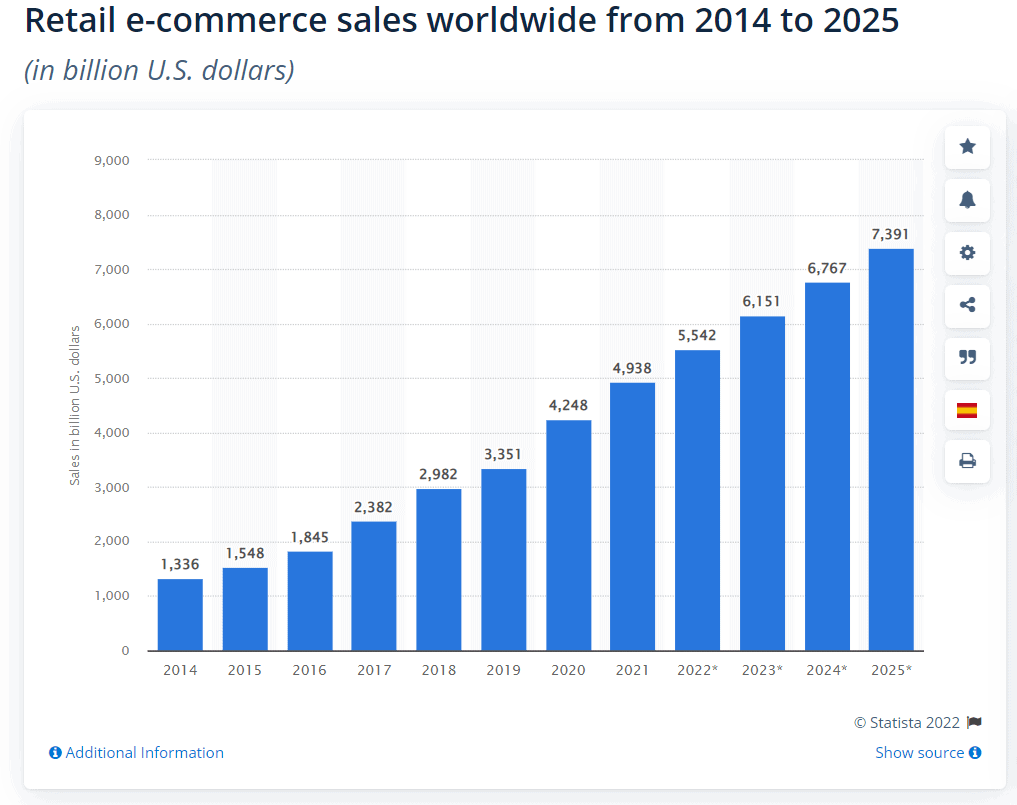E-commerce has changed the way we do business. With the advent of the internet and technology, it’s never been easier to sell products and services online. However, with so many options available, it can be tough to know which platform is the best fit for your business.
In this article, we’ll explore some of the most popular online selling platforms and what makes each one unique.
Table of Contents
Online selling platforms: Brief Introduction
Online selling platforms are websites or applications that allow businesses and individuals to sell their products or services online. These platforms provide the infrastructure, tools, and features necessary to create an online store, manage products, process payments, and handle shipping and fulfillment.
Each online selling platform has its own set of features, tools, and functionalities, so it’s important to choose one that meets the specific needs of your business. Some platforms are designed for small businesses and offer a user-friendly interface and basic features, while others are designed for larger businesses and provide a more comprehensive set of tools and functionalities.
By using an online selling platform, businesses can reach a wider audience, increase their visibility, and grow their sales.
Different Types of Online Selling Platforms
There are several types of online selling platforms, each with its own unique features, tools, and functionalities. Some of the most common are below;
A. Marketplaces
Marketplaces are online selling platforms that allow businesses and individuals to sell their products directly to customers. Marketplaces provide a central platform for buyers and sellers to interact, with the marketplace taking care of payment processing, shipping, and customer service.
Marketplaces typically charge a fee or commission for each sale.
B. Multi-Vendor Marketplaces
Multi-vendor marketplaces allow multiple vendors to sell their products on a single platform. Vendors have their own online store within the platform and are responsible for managing their own products, payments, and shipping. An example of a multi-vendor marketplace is Etsy.
C. Hybrid Marketplaces
Hybrid marketplaces combine elements of both marketplaces and multi-vendor marketplaces. With a hybrid marketplace, businesses and individuals can sell their products directly to customers, as well as set up their own online store within the platform. An example of a hybrid marketplace is Shopify.
D. E-commerce Platforms
E-commerce platforms allow businesses to build and manage their own online store. With an e-commerce platform, businesses are responsible for managing their own products, payments, shipping, and customer service. Shopify, Volusion, and Squarespace are examples of e-commerce platforms.
E. Self-Hosted Solutions
Self-hosted solutions allow businesses to build and manage their own online store, but with the added benefit of having complete control over their own data and hosting. PrestaShop is an example of a self-hosted solution.

Find Top 10+ Online Selling Platforms 2024
Online selling platforms provide businesses with a platform to showcase their products and reach a wider audience. Get details below;
Amazon
Amazon is one of the largest and most well-known e-commerce platforms in the world. It’s a great option for businesses looking to reach a large and diverse audience, as it attracts millions of shoppers every day. With Amazon, you have the ability to list and sell products in a variety of categories, from books and electronics to clothing and home goods.
Amazon provides a ready-made market for your products. The platform is easy to use, and the company offers a variety of tools and resources to help you succeed, such as Amazon’s fulfillment services and marketing tools. However, the competition can be intense, so it’s important to be strategic in your approach.
Etsy
If you’re an artisan, crafter, or maker, Etsy is a great platform for selling your unique products. The platform has a large and engaged community, and it’s easy to list and manage your products.
Etsy provides a sense of community and connection with your customers. The platform has a strong focus on supporting independent and creative businesses, which can help you stand out in the crowded e-commerce landscape. However, the platform does have strict guidelines for what can be sold, so be sure to familiarize yourself with the rules before setting up shop.
eBay
eBay is one of the oldest and most established online selling platforms. It’s a great option for businesses of all sizes, as it provides a diverse audience and a wide range of products and categories. With eBay, you can list and sell items through auction-style or fixed-price listings, and the platform offers a variety of tools and resources to help you succeed.
eBay has a long history and a well-established reputation, which can help you build trust with customers. However, the platform is highly competitive, so it’s important to be strategic in your approach and stay up-to-date with the latest trends and best practices.
Shopify
Shopify is a powerful e-commerce platform that allows businesses to build and manage their online store. It’s a great option for businesses of all sizes, as it provides a wide range of tools and resources to help you succeed. With Shopify, you can manage your store, process payments, and handle shipping and fulfillment all in one place.
Shopify is highly customizable and flexible, allowing you to create a unique and tailored online store. The platform also provides a variety of marketing and SEO tools to help you drive traffic and increase sales. However, it does come with a monthly fee, so be sure to factor that into your budget when considering this option.
WooCommerce
WooCommerce is a free, open-source plugin for the popular content management system, WordPress. It’s a great option for businesses that already have a WordPress website and want to add e-commerce capabilities. With WooCommerce, you can sell physical and digital products, manage your inventory, and process payments, all through a user-friendly interface.
WooCommerce is highly customizable and can be easily integrated with other WordPress plugins and tools. Additionally, the platform provides a variety of payment gateways, shipping options, and tax settings to help you run your business efficiently.
However, it does require some technical knowledge and understanding of WordPress to set up and manage, so be sure to have the necessary skills or resources.
Magento
Magento is a robust, open-source e-commerce platform designed for large and complex online stores. It’s a great option for businesses that need a highly customizable and scalable platform to meet their growing needs. With Magento, you can manage your products, process payments, and handle shipping and fulfillment, all through a user-friendly interface.
Magento provides a wide range of features and functionality, allowing you to create a unique and tailored online store. The platform is highly customizable and can be easily integrated with other tools and systems, such as payment gateways and shipping carriers.
It can be complex and challenging to set up and manage, so be sure to have the necessary skills or resources to get the most out of this platform.
BigCommerce
BigCommerce is a cloud-based e-commerce platform designed for businesses of all sizes. It’s a great option for businesses that want a user-friendly platform that can be easily set up and managed. With BigCommerce, you can manage your products, process payments, and handle shipping and fulfillment, all through a user-friendly interface.
BigCommerce provides a wide range of features and functionality, allowing you to create a unique and tailored online store. The platform is highly customizable and can be easily integrated with other tools and systems, such as payment gateways and shipping carriers. Additionally, BigCommerce provides a variety of marketing and SEO tools to help you drive traffic and increase sales.
Wix
Wix is a cloud-based website builder and e-commerce platform that’s designed for businesses of all sizes. It’s a great option for businesses that want an easy-to-use platform that can be set up and managed without any technical knowledge or skills. With Wix, you can build a website and add e-commerce capabilities through a user-friendly drag-and-drop interface.
Wix is user-friendly and easy to use, allowing you to create a professional-looking online store in a matter of minutes. The platform provides a variety of templates, themes, and tools to help you build a custom online store that meets your needs.
Also, Wix provides a range of payment and shipping options, as well as marketing and SEO tools to help you succeed.
Shopify
Shopify is a cloud-based e-commerce platform that’s designed for businesses of all sizes. It’s a great option for businesses that want a user-friendly platform that can be easily set up and managed. With Shopify, you can manage your products, process payments, and handle shipping and fulfillment, all through a user-friendly interface.
Shopify provides a wide range of features and functionality, allowing you to create a unique and tailored online store. The platform is highly customizable and can be easily integrated with other tools and systems, such as payment gateways and shipping carriers. Shopify also provides a variety of marketing and SEO tools to help you drive traffic and increase sales.
Volusion
Volusion is a cloud-based e-commerce platform that’s designed for businesses of all sizes. It’s a great option for businesses that want a user-friendly platform that can be easily set up and managed. With Volusion, you can manage your products, process payments, and handle shipping and fulfillment, all through a user-friendly interface.
One of the benefits of using Volusion is that it provides a wide range of features and functionality, allowing you to create a unique and tailored online store. The platform is highly customizable and can be easily integrated with other tools and systems, such as payment gateways and shipping carriers. It provides a variety of marketing and SEO tools to help you drive traffic and increase sales.
Squarespace
Squarespace is a cloud-based website builder and e-commerce platform that’s designed for businesses of all sizes. It’s a great option for businesses that want an easy-to-use platform that can be set up and managed without any technical knowledge or skills. With Squarespace, you can build a website and add e-commerce capabilities through a user-friendly drag-and-drop interface.
Squarespace is user-friendly and easy to use, allowing you to create a professional-looking online store in a matter of minutes. The platform provides a variety of templates, themes, and tools to help you build a custom online store that meets your needs.
Additionally, Squarespace provides a range of payment and shipping options, as well as marketing and SEO tools to help you succeed.
PrestaShop
PrestaShop is a free, open-source e-commerce platform designed for businesses of all sizes. It’s a great option for businesses that want a highly customizable platform that can be easily set up and managed. With PrestaShop, you can manage your products, process payments, and handle shipping and fulfillment, all through a user-friendly interface.
PrestaShop offers a wide range of features and functionality, allowing you to create a unique and tailored online store. The platform is highly customizable and can be easily integrated with other tools and systems, such as payment gateways and shipping carriers. Also, PrestaShop provides a variety of marketing and SEO tools to help you drive traffic and increase sales.
Factors to Consider When choosing an online selling platform
When choosing an online selling platform, there are several factors to consider to ensure that you choose the right one for your business. Some of these factors include;
- Ease of use: The platform should be user-friendly and easy to use, especially if you don’t have any technical knowledge or experience.
- Customization: The platform should allow you to customize the look and feel of your online store, as well as add your own branding and logos.
- Payment processing: The platform should provide a variety of payment options, such as credit cards, PayPal, and other payment gateways, and should have secure payment processing capabilities.
- Shipping and fulfillment: The platform should provide shipping and fulfillment options, such as flat rate shipping, weight-based shipping, and calculated shipping, and should integrate with popular shipping carriers.
- Product management: The platform should provide an easy-to-use interface for managing your products, including adding and editing product descriptions, images, and pricing.
- Marketing and SEO: The platform should provide marketing and SEO tools to help you drive traffic and increase sales, such as email marketing, social media integration, and optimized product listings.
- Integration with other systems: The platform should be able to integrate with other tools and systems, such as accounting software, customer relationship management (CRM) software, and other e-commerce platforms.
- Customer support: The platform should provide adequate customer support, including email, phone, and live chat support, to help you with any questions or issues that arise.
- Cost: The platform should be affordable and provide value for the features and tools it offers.
Conclusion
Selling online has become an essential aspect of modern business and has opened up numerous opportunities for entrepreneurs to reach a wider audience. With the variety of online selling platforms available, it’s essential to choose one that meets your specific business needs and goals.
By understanding the features and benefits of each platform, you can make an informed decision and start reaching new customers and growing your business online.
Whether you’re a small business owner, freelancer, or online seller, the right online selling platform can help you achieve your goals and succeed in the competitive world of e-commerce.






















+ There are no comments
Add yours